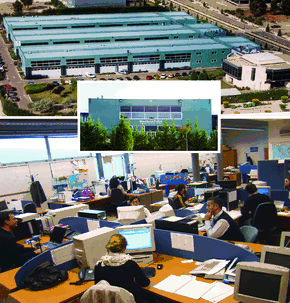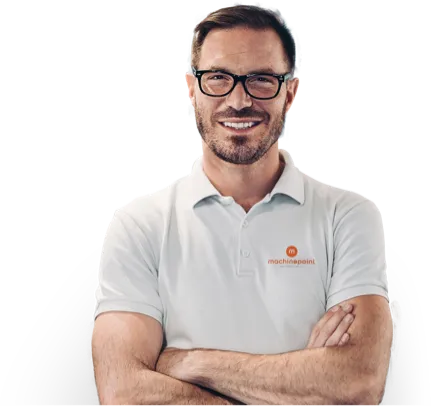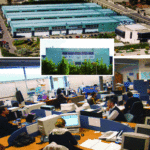Question. Mr. Rodríguez, How many years have you been in our industry?
CRG. 20 years. I started in 1988 in the Jagenberg Gruppe with machinery for paper, cardboard, plastic and liquid food. In 1995 I jumped into the Aluminum High Pressure Die-Casting Industry, and since 1997 we have been operating in the used machinery market with Plastics, Packaging and Liquid Food machinery. After failing to create an online used machinery marketplace in 2000, MachinePoint bet on advising and delivering used industrial machinery to its customers in a very professional way.
Question. MachinePoint puts in contact buyers and sellers directly?
CRG No. MachinePoint selects the best machinery and provides the best engineering and logistics service to its customers. Our failure in 2000 showed us that customers are not satisfied if left alone selling or buying equipment. They need the best professional company to take care of collection, legal agreements, dismantling, packaging, loading, transportation, custom formalities, commissioning or repairing machinery. Most deals would not happen without our intermediation or the intermediation of other excellent professionals in the market.
Question. Who is MachinePoint’s customer: The buyer or the seller?
CRG. Both. The machinery owner needs an specialist to promote, sell, collect, dismantle, package and export the machine. The buyer needs a professional organization to select the best machine in the market to fulfill his needs, and to dismantle, package and transport it to guarantee safe delivery. Both need financial intermediation to provide 100% payment before delivery to the owner, and L/C experience to secure delivery and allow up to 1-year financing if needed.
Question. How do you see the situation in the industry? How is the crisis affecting?
CRG. This is the severest crisis that I remember and it will probably be the worst that we are going to live. Global financial integration, while helpful, has made the world more complex and has increased the size of the shock that countries are subject to. Not so long ago, most mortgages were of the 30-year fixed-rate variety. Shopping was easy: find the lowest monthly payment. Now they come in countless forms. Even experts have trouble comparing them and a low initial monthly payment can be a misleading guide to total costs (and risks). A main cause for the mortgage crisis is that borrowers did not understand the terms of their loans. Yet growing complexity on the borrowers’ side was trivial compared with what was going on at the banks. Now mortgages are not kept by the banks, but they are sold and sliced into mortgage-backed securities, which include complex derivative products. With this new complexity, even sophisticated investors got things badly wrong, and our banks are now into deep trouble, and with them, our industry.
Developing countries, beset with their own problems, have little time and interest in a Global Agenda. Emerging markets will stop accepting being under scrutiny when industrial countries show scant regard for multilateral institutions. Governments of the G20+ are acting vigorously and synchronized and this is very positive. This, however, is not enough, and the IMF should be reformed, grow in size, exercise world-wide regulatory control and gain financial independence to avoid needing to go back to key shareholders for funds (which effectively gives them a veto over Fund activities). As Taxpayers, we are going to have to pay for all this mess, but the economy will start recovering in 2009, I expect.
Returning to our markets, we can observe that consumption has contracted enough to force processors to cut investments in new technologies. Processors, however, keep investing in good used machinery now in abundance. OEMs are suffering the crisis most than anyone as a small contraction in GDP is amplified many times in the Capital Equipment Industry. The situation is not sustainable and Industrial Countries need to resume investing in new technologies to keep their lead in the market.
Question. But this situation is favoring you, isn’t it?
CRG. Yes, but as I said, we need to think long-term in what industrial countries need. We need the latest technologies to keep our technical lead and be able to compete in international markets, and the investment in used machinery can only help processors to maintain their production capacity, but not to lead the market with innovative and ecological products. OEMs should be able to sell their latest innovations, or we might lose one of the industries in which Europe, specially Germany, has been able to keep Global Leadership.
Question. Will you encourage our governments to incentivize investments in latest technologies?
CRG. I do not like when governments help companies because they tend to waste taxpayers money (think about Alitalia or General Motors). However a fiscal stimulus is needed for processors to resume investing and start creating jobs again. This will help consumption to recover, and with it the overall economy. Let me add here that stimulus to invest in new technologies should not be made increasing the tax on the sale of used machinery, as Italy did with very negative consequences. Companies need to be also incentivize to sell used equipment to free space and needed cash to finance investments in new equipment.
Question. What do OEMs think about your service?
CRG. Well, you should address this question to them, but we keep close ties with the best OEMs in the sectors in which we operate. Our ability to sell equipment helps OEMs and leasing companies sell their trade-ins, and this, in return, helps leasing companies improve the financial conditions to Processors, and OEMs to keep their customers in the lead (as reads the Husky motto, by the way).





